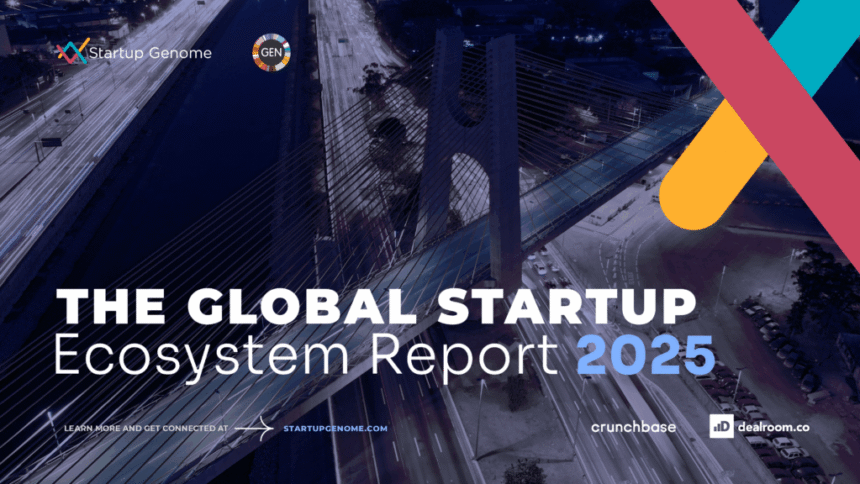Miami ranks No. 22 in the world among startup ecosystems, according to the 2025 Global Startup Ecosystem Report released by Startup Genome and the Global Entrepreneurship Network today. Against its US peers, our metro area ranks 10th.
The 2025 GSER includes research and insights from more than 350 entrepreneurial ecosystems and 5 million startups; it’s the largest quality-controlled dataset in the industry. The 328-page report looks at the current state of startup activity and includes a ranking of the top 40 global ecosystems and top 100 emerging ecosystems driving innovation.
Results globally and locally showed a dramatic slowing of growth following the pandemic runup, the report said. In this year’s report, ecosystem value dropped 31% globally, marking a significant break from years of sustained growth.
For the first time, the GSER rankings include an AI factor that over time will track startup ecosystems’ Native AI transitions. This year’s report found that 90% of AI funding is concentrated in the US (mainly Silicon Valley) and China, signaling to the rest of the world that they need to rapidly implement targeted entrepreneurial AI policies or risk falling woefully behind the big two.
“We stand at the beginning of the AI era, one that will define the economic trajectory of nations for decades to come,” said Startup Genome founder and CEO JF Gauthier, in the report. In response, Startup Genome is launching a global entrepreneurial AI policy coalition to support these efforts.
Year over year, the Miami metro area fell in this ranking – the metro area was No. 16 last year. Only 16 ecosystems in the top 40 moved up. For Miami, the main reason it fell was because overall exit activity in Miami was down significantly from the previous year’s findings. In fact, the ecosystem only logged 12 $50 million or higher exits, about half the total in 2024 report, and no billion-dollar exits, explained Startup Genome Managing Partner Stephan Kuester, in an interview with Refresh Miami. That significantly pulled down the “Performance” category, which makes up the largest part of the scoring, he said. The largest exit in 2024 was Magic Leap’s at a $450 million valuation.
But in other areas such as funding and market reach, which includes Miami’s growing connections with Latin America and Israel, Miami slightly improved its score in funding access, quality and activity, Kuester said. Still, the number of seed-stage deals in Miami were down by half, he said, and by deal value seed funding was down by 40%. Series A deals were down too, but not as extreme.
A bright spot in this year’s report was that Miami’s late-stage investment was up – “there were fewer rounds at the late stage, but bigger ones,” said Kuester. Indeed, the late-stage funding total grew from $665 million in the last report to $732 million. The time period studied for deals for this report was the second half of 2022 through 2024, which included some of 2022’s all-time record funding of $5.8 billion for the Miami area.
It’s better to compare our funding level to 2020, Kuester said, because the Covid runup our area experienced could not be sustained, and we are on par with 2020. Indeed, my own reporting on Miami area venture capital shows that we began to see a surge of funding in 2018, and the 2024 funding level of $2.77 billion was higher than levels achieved in 2018, 2019 and 2020 ($6.5 million was the 3-year total), but far lower than in 2022. So far, however, 2025 looks promising, with Q1 logging $900 million. Overall, “it’s perhaps a bit of normalization after the hype,” and not unlike what other ecosystems experienced, said Kuester.
More Miami results
There are eight active (pre-exit) unicorns in Miami, and that number was on the rise during the pandemic, a powerful signal for the ecosystem that there’s talent in Miami and startups can scale up and access investors.
Miami continued to be strong in market reach not only domestically but to Latin America and beyond. This ranking is based partly on the number of company secondary offices in the region. Miami companies also have a strong number of secondary offices in international markets. To be sure, global connectedness gives startups access to more customers as well as global knowledge about new business models and innovations. What’s more, Latin America startups have struggled but may be increasingly looking to Miami to expand their market reach, Kuester said.
Indeed, soft landing programs locally have been growing over the years — with Mana Tech, Global Ventures and CIC offering strong soft landing programs, to name a few. Plus, Miami, long a magnet for Latin American startups, has been growing its ties in Europe, Israel and beyond. [Read our special report on soft landing programs here.]
“Miami was this shining light during and post COVID, so maybe it’s now back to a more normal footing — that is pretty much what data tells us,” Kuester said. “But this is not a doom and gloom message – Miami is number 22 in the world, my goodness.”
Still, challenges remain in Talent & Experience (scoring 3 of 10) and Knowledge (1/10), according to the report. These categories typically lag in younger ecosystems, and Miami’s overall scores in these two areas did not change from the 2024 report, but there was slight improvement, Kuester said.
Ecosystem challenges and advice for Miami
The Talent & Experience area is tied to such factors that include the number of large exits and Series A funding rounds over the last decade, the number of developers highly ranked on GitHub, the number of STEM students enrolled in local universities, life science disciplines available, and software engineer salaries. Notably, the highest scoring success factor for Miami in the Talent & Experience category was STEM access, perhaps a nod to strong work by our universities and colleges, including new programs in AI.
The Knowledge category is largely a proxy for the number of patents coming out of both the university and corporate sector as well as university research output. With Miami neither having the elite universities nor the corporate base of some higher ranking ecosystems, a larger score should not be expected, but the category is only 5% of the overall ranking. Still, a positive sign is that satellite university campuses – such as Babson, Northwestern and most recently Northeastern – have opened and other institutions are considering the Miami region.
What is Kuester’s advice for Miami? “Make sure you participate in the AI steam train that’s left the station. Currently you are not that much,” he said (Miami scored a 2 out of 10 in the new AI category). “Seeing the outputs at the moment, Native AI creation is not where it should be.”
There’s a need for stronger corporate-startup collaboration and ambidexterity between academia and R&D companies to boost AI capabilities and economic impact, and it’s not only a Miami issue, Kuester continued. “It is a train that’s moving so quickly, and it’s going to hit 90% of all ecosystems around the world if you don’t take the right measures.” Stay tuned for a deeper dive into AI by Startup Genome.
The GSER has been produced since 2012. Miami broke onto the Global Listing as a runner-up (tied at 36th with four other ecosystems) in 2019. In 2020, Miami moved up to 31st. In 2021, despite the momentum the ecosystem was experiencing, the ecosystem fell off the list (it ranked No. 10 on the Emerging Ecosystems list) and a researcher explained that the ecosystems in the universe that they were studying had grown so there was more competition. In 2022, however, Miami was again a runner-up, ranking 33rd on the Global Top 40 ranking – setting itself up to leap 10 places to No. 23 in 2023, then to No. 16 in 2024’s report, and now 22th in the world. Miami also ranked in the top 30 in StartupBlink’s global ranking this year.
Tampa and Orlando land in Top 100 Emerging Ecosystems
This year’s report also included the Top 100 Emerging Ecosystems ranking of earlier-stage metro areas. Two Florida ecosystems ranked on that list. Orlando ranked in the 31-40 group, falling from the 21-30 grouping last year, and Tampa ranking in the 51-60 group, falling from the 31-40 grouping last year, on the Emerging Ecosystems list.
Orlando ranked on the Emerging Ecosystems list for the second year in a row and was nearly equally strong in all the categories, doing the best in market reach. Its region includes the Space Coast, and its strong corporate sector includes many defense and aerospace companies that are churning out lots of patents and talent generation for them is supported by the region’s university programs, which include the University of Central Florida and several other tech-focused colleges.
Tampa, which ranked on the Top Emerging Ecosystems list for its third year in a row, has an engaged corporate community, particularly in fintech and cybersecurity as well as strong startup support organizations and universities. The Tampa Bay region scored highest for funding and knowledge, but fell in performance mainly because of a lack of large exits, similar to Miami.
US and global highlights
Miami was in good company in the GSER ranking. The top 10 ecosystems, in order, are: Silicon Valley, New York City, London, Tel Aviv, Boston, Beijing, Los Angeles, Seoul, Singapore and Shanghai. The other US cities in the top 20 were Philadelphia (13), Seattle (15), Chicago (16), Washington DC (17) and San Diego (19). Besides No. 22 Maimi, the other US cities in the top 40 are: Denver-Boulder (26), Atlanta (28), Austin (30), and Dallas (38).
Here are some more global highlights and insights of this year’s report:
- AI & Big Data surged, becoming the fastest-growing sub-sector with a 33% increase in VC funding, now commanding 40% of all global VC investment, up from 26% in 2021.
- The global disparity in Ecosystem Value change is stark: Asian and sub-Saharan African ecosystems saw a decrease of 17%, while Latin America experienced an aggregate drop of 45%, Europe 24%, MENA 22%, Oceania 19%, and North America 18%.
- São Paulo remains Latin America’s only Top 40 ecosystem at #37, leading the region in overall performance. Meanwhile, Mexico City continues to lead among emerging ecosystems.
- Across last year’s Top 40 ecosystems, the total count of large exits decreased by a troubling 31%. Those bucking this trend were primarily Asian ecosystems – Shenzhen, Tokyo, Seoul, and Shanghai – together with Paris and Philadelphia.
- Speaking of Philadelphia, the City of Brotherly Love jumped 12 places to #13, the most significant movement of all North American ecosystems in the Top 40.
- Hong Kong made the most significant improvement of all Top 40 Global Startup Ecosystems, jumping up from the Emerging Ecosystems ranking in 2024 to #27 globally this year.
- Paris and Madrid were the only European ecosystems in the Top 40 to improve rankings, with Paris rising to #12 following a surge in unicorns and early-stage deals. Though still Europe’s top performing ecosystem, London dropped one place to the #3 globally – it was tied with New York City for #2 from 2020-2024.
- Riyadh had the most significant growth in MENA, moving up from the 51-60 range in 2024 to the 21-30 range among the emerging ecosystems, fueled by major growth in exits over $50 million.

“The lesson is unmistakable: The bold change the world. Ecosystems that move rapidly to develop AI-specific strategies will reap the greatest rewards. Those that hesitate risk being left behind,” said Jonathan Ortmans, president of the Global Entrepreneurship Network.
Download the 2025 Startup Global Ecosystem Report (GSER) here.
READ MORE IN REFRESH MIAMI:










